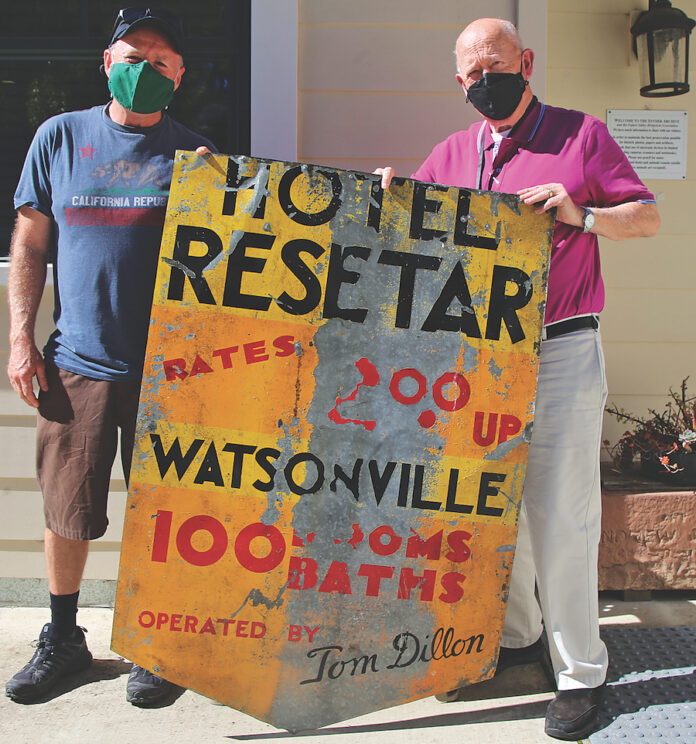WATSONVILLE—Buried in the wall of an old shed in Santa Cruz for decades, an early-day sign from the historic Hotel Resetar in downtown Watsonville recently resurfaced during a demolition job.
“I knew of the Hotel Resetar for a long time, so when I saw my neighbor pull that sign out of his shed I felt it was best to get it into the right hands in Watsonville,” said Rick Larsen.
A long-time resident and homeowner in the Seabright area of Santa Cruz, Larsen said his neighbor has been busy demolishing a shed next door. The sign, Larsen said, had been used as makeshift paneling in the shed.
“There were other signs being used as well,” Larsen said. “There was one that read ‘Auto Radios Repair.’ That one was really faded though.”
Larsen said he contacted this publication after doing research on Hotel Resetar where he spotted an article about the five-story building that was completed in 1927. His research then led to the Pajaro Valley Historical Association where Larsen on Tuesday donated the metal painted sign to the organization.
Bill Beecher and others at PVHA aren’t sure of an accurate date of the sign but estimate that it was from the early 1930s.
Hotel Resetar, described in the Pajaronian records as “the grandest hotel” on the Central Coast in its early days, was designed by famed architect William Weeks, who designed scores of buildings in Watsonville, the Central Coast and the greater Bay Area. It originally opened with 100 rooms and boasted a huge fireplace in the lobby, mahogany woodwork, leaded glass French doors that led to a writing room and a patio with a tiled fountain.
In 1957 Hollywood star Kim Novak stayed there a few nights during the filming of the Alfred Hitchcock movie “Vertigo” in San Juan Bautista.
The hotel was the brainchild of Mike, Mitchell and Louis Resetar, according to the late historian Betty Lewis. The ground floor, upon opening, included the Cozy Sweet Shoppe, Misses DuCommon’s Millinery with the Hollister Grocery attached to the north side and the Piedmont Hotel at the left.
Today, it serves as supportive and affordable housing for vulnerable populations such as formerly homeless veterans.
“I just thought that someone would like the sign and that it would be a good thing to get it to a place where it can be shared,” Larsen said.
The faded and chipped sign includes the words “Operated by Tom Dillon,” whose name arrears on a tax form from the hotel in 1931. The sign also reads that rates are $2 a night and up.









